 Living with Babies Born Small
Living with Babies Born Small
Here are explanations on how to spend your time in the hospital, interacting with your baby, developmental care, family visits, team medical care, mother's heart, and what the father can do.
In the Hospital
Interacting with the Baby
Physical contact is important for any baby. The warmth of the parents' hands, the feeling of being cuddled, and the feeling of skin touching, will help your baby's emotional stability and good sleep.
Touching
Touching is one of the physical contacts with a baby. Once you get used to touching your baby, try using your palm as much as possible and feel your baby’s head, back, and hips, with a large area of your skin.
Holding
If your baby is fretting, gently wrap him/her with the palm of your hands. Wrap your baby gently to let him/her know that "he/she is cuddled, everything is okay, and that he/she is not alone".
Kangaroo Care
Sit down so you can relax, unbutton so that your chest is showing, hold your baby face down, and hold the baby so his/her skin is touching your skin. Feel the warmth of one another and spend a relaxing time together.
At first you may think "Is it okay to touch the baby? Will I make him/her cry?" and be scared to touch the baby. Touching is good experience for the baby. Closely watch your baby and get used to touching him/her slowly.

Developmental Care
Care for development is called "developmental care". This promotes the growth and development of the baby by providing an environment as close as possible to the mother's womb. Details of care varies depending on the facility, but here we will introduce the main types of care.
Positioning (maintaining fetal posture)
A good posture for your baby is to be round, just like when he/she was in the mother's womb. Wrap the baby with blankets or other cloth so that he/she can maintain this posture.
Type of care according to sleeping conditions
Carefully watch how well your baby sleeps and awakes, and try to avoid taking care of the baby when he/she is sleeping very deeply. Try to find the best timing that is comfortable for the baby, to take care of him/her.
Consideration to light and noise
A baby feels light and sound through the amniotic fluid when he/she is in the mother’s womb. When the baby comes out, he/she feels light or noise more strongly, so dim the lights to make it soft and try not to make loud noises.
It is important that the parents work together with the nurses for developmental care. One good way for developmental care is appealing to the five senses, such as talking to the baby. Let’s start with what you can do.

Family Visits
Being with the family gives great energy to a baby. Please go visit your baby. Touch the baby gently and talk to him/her. The baby will surely feel very comfortable hearing the voices of his/her mother and father that was also heard in the womb. While visiting, you can touch your baby, change his/her diaper with the nurse, and wipe your baby’s body. The nurse will help deepen the bond between the baby and your family.
Visiting hours will differ depending on the facility. Considering the prevention of infection, visitors are often limited to mothers and fathers, but depending on the facility, grandpas, grandmas, and siblings can also visit. If the baby’s siblings would like to visit, it will be good to have them vaccinated in accordance with their age and keep them in a good state of health.

Infection control during visits
For newborn babies still in hospital, having their families visit is significantly meaningful and gives them great energy for them to grow in a healthy way. However, because newborns are immunologically immature and susceptible to infection, infection control during visits is extremely critical.
What you can do before you visit
If adults have even a slight cold, it may cause infants to develop a severe disorder. Inform medical staff if you have any symptoms of illness. Information about contact with epidemic diseases, such as COVID-19, is important. You must have a correct understanding of the information.
What to do when visiting your baby in NICU
It is extremely important to carry out correct hand hygiene. Hand hygiene includes washing your hands with soap under running water, and disinfecting your hands using alcohol-based hand sanitizers. Wash your hands with soap under running water for at least 20 or more seconds and dry them thoroughly. Rub alcohol-based hand sanitizer into your hands for a minimum of 15 seconds. In particular, do not forget to wash your thumbs and fingertips, including your fingernails.
Carry out hand hygiene before and after touching your baby and after touching nearby medical equipment and objects. Be careful not to touch your hair or mask that you are wearing during a visit.

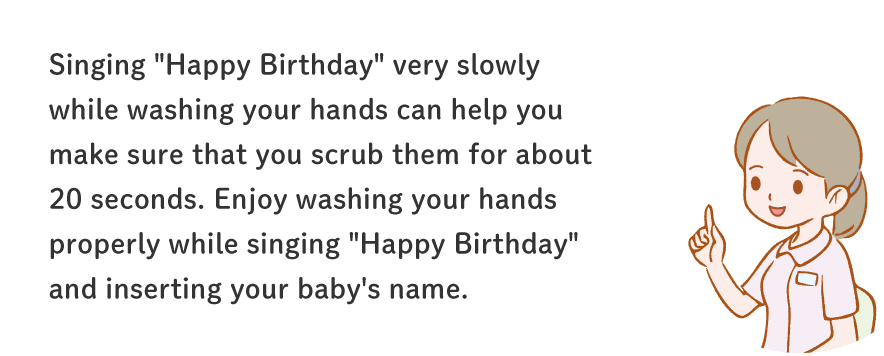
Team Medical Care
In the NICU/GCU, not only doctors and nurses, but also people from various occupations are involved in order to support babies and their families as a team.
Pharmacist
The pharmacist works with the nurses, preparing IV drips for the babies and giving explanations to the family about the medicine they will be taking home.
Clinical Psychologist
Clinical psychologists will watch over the development of the babies. They will also give mental support for the families because the hospitalization of a baby in the NICU/GCU is often an unexpected event in life.
Physical Therapist
Especially babies born prematurely and small, may need support for motor development, so the physical therapist will check the posture and movements of the body and will also perform respiratory rehabilitation.
Discharge Coordination Department
The staff in this department will contact the local community nurse and make adjustments as they discuss any preferences with the family that they may have, so that the family can receive the support in their area of residence that suits them.
In addition, there are other supporting staff such as dietitians who prepare milk, and social workers who you can consult with to learn about the medical system. The support system differs depending on the facility, but if you have any concerns or problems, do not hesitate to consult with us.
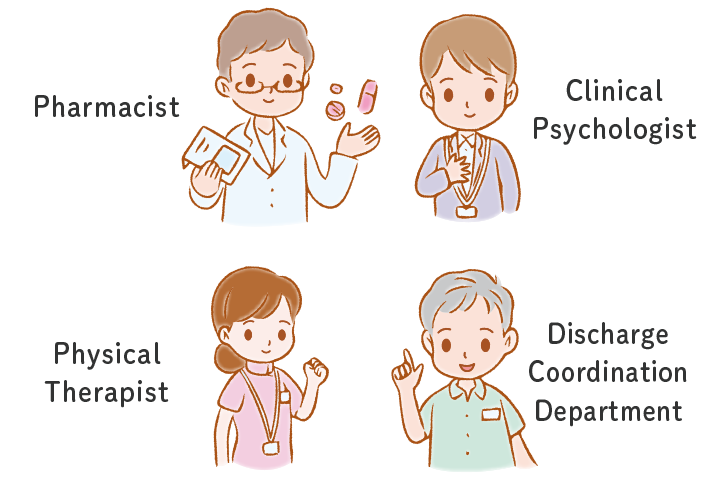
The Mother’s Heart
Pregnancy and childbirth will bring about major changes to the mother's body. The balance of a mother’s body that adjusted to pregnancy will change back to the original balance after giving birth, and the mother also has to adapt to a new lifestyle taking care of the baby. It is common for anyone to experience temporary instability as a result of this rapid change in the hormones.
On the other hand, when someone faces an unexpected situation such as your child being hospitalized, it takes a certain amount of time to accept the reality. Questions like "Why?" or a feeling of anger like "Why is this happening to me?" will come to mind, but it is very natural for people to be depressed with a reality that can't be helped even when you try hard. Especially, while your baby is still unstable you will fluctuate between hope and despair each time you hear from the medical staff.
Some may also think that you must be strong because you are a mother. But no one can immediately adapt as a mother. It is okay for the mother to evolve as a mother slowly with the baby. Do not strain yourself and think "I have to try hard!", and have the people around you understand the feelings that you are going through. Then, slowly start with what you can at your own pace.
What the Father Can Do
When a baby is born prematurely and small, the father may not be able to think straight with "shock and anxiety" more than "happiness". The father may be in panic, but he will be given many roles such as, "explanation from the doctor on the baby’s medical condition", "hospitalization procedures", and "supporting the mother".
While the father takes care of these roles, the baby will be growing day by day. To be honest, it will be unfortunate if you miss these miraculous days. Working at the same time may be hard, but please go visit your baby as much as you can. The baby will be happy, and that will heal the mother’s mind and body. The "shock and anxiety" will decrease and "feelings of relief and growth of your baby" will increase.
There are many things that only the father can do.

Caring for siblings at home NEW!
During hospitalization
Older siblings always look forward to seeing new babies. As such, they may feel afraid or worried if their new baby sister or brother cannot be discharged from the hospital. Under such circumstances, explain the reason why the new baby brother or sister cannot come home. Show them videos or photos of their struggling baby brother or sister. Although they may at first say they feel sad, they should cheer for their baby sister or brother, and finally say with a smile that the baby is cute. We adults learn what is important by watching them genuinely accept a new baby sister or brother without prejudice.
Handling of siblings varies by hospital. Try telling hospital staff what you would like to do. In the NICU, healthcare providers value family-centered care. Feelings of mothers may take form.
After leaving the hospital
When a newborn baby is brought home from the hospital, siblings may start behaving in babyish ways. Remember that this is proof that the older siblings have received enough affection from their parents. You should feel confident.
Older siblings may have mixed feelings. They may think the baby is cute, but dislike being deprived of their mother's affection. Support how they feel and give them lots of praise when they are able to accept the new situation. Have them help with their new sister or brother and tell them how grateful you are. It is also effective to specially reserve time for them to have their mother all to themselves.
This is where fathers come in to the picture. The father should create chances to play with older children more than ever. By doing so, not only will the children smile but the mother will too.
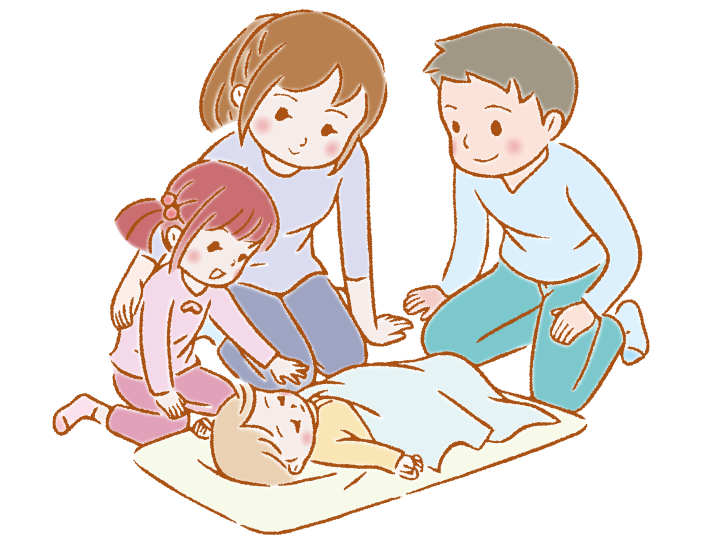
Towards Discharge
Preparing for Discharge
Before leaving the hospital, mothers will be excited but at the same time she will be full of anxiety.
If you have any concerns, it is important to ask and resolve them with the medical staff before leaving the hospital. In addition, it is a good idea to confirm in advance, who to consult after being discharged.
When preparing the environment for your baby at home, you will look through a variety of useful childcare goods. However, it is not necessary to have them ready from the beginning, and it is better to purchase them little by little while preparing the minimum requirements.
Once you have prepared a certain amount of goods, imagine how daily life will be like at home. Make good use of the support from your family and those around you to have fun raising your child. Also, it is good to know about the local services available, through persons such as the public health nurse.

After Discharge
Living and Taking Care at Home
When you start living with a new family, you may be worried and concerned about many things. But the baby is excited to be at home.
First, try to adjust the rhythm of life. Adults also have to adjust to the baby's rhythm of life. It may be difficult right after you leave the hospital, but please adjust gradually.
As you spend your days with your baby, you may have various concerns such as when the baby won't stop crying, does not drink milk as you expected, or when the baby is not gaining weight as well. Many things can be new to you when you are living with a baby for the first time and the smallest things may worry you. Don't keep your worries and troubles to yourself. Let the people close to you, such as the medical staff, local public health nurses, and visiting nurses know. Mothers and fathers will gradually get used to life at home with their babies.

Attending the Hospital and Periodic Health Examinations
You may be nervous when attending the hospital for the first time. You may be worried about things like what you should bring with you, the means of transportation, what you should do when it is time to breastfeed while in the hospital etc. Before going to the hospital, prepare your belongings and simulate how you will be traveling. It is also good to pack diapers and clothes for changing. People tend to forget their Mother and Child Handbook, but it should be carried around whenever you go outside.
When you actually see the doctor in person at the medical examination, you may be nervous and not be able to ask what you wanted to. So it may be a good idea to write down what you want to tell or ask the doctor. Nowadays, many mothers are good with smartphones and useful apps.

Infection Control
Infection control at home is different from that in the NICU. You cannot stay aseptic as you were in the NICU. Certainly, if your baby is born small you may be worried that his/her immunity is weak. But please do not be too sensitive.
For babies, having an adult prepare the baby’s environment helps prevent infection to some extent. Adults can protect their babies by living normally, such as washing their hands thoroughly, not going out in the crowd, and avoiding contact with people with colds. It is also important to take a walk avoiding the crowds on a sunny day. Consult your doctor when there are any symptoms that may worry you.
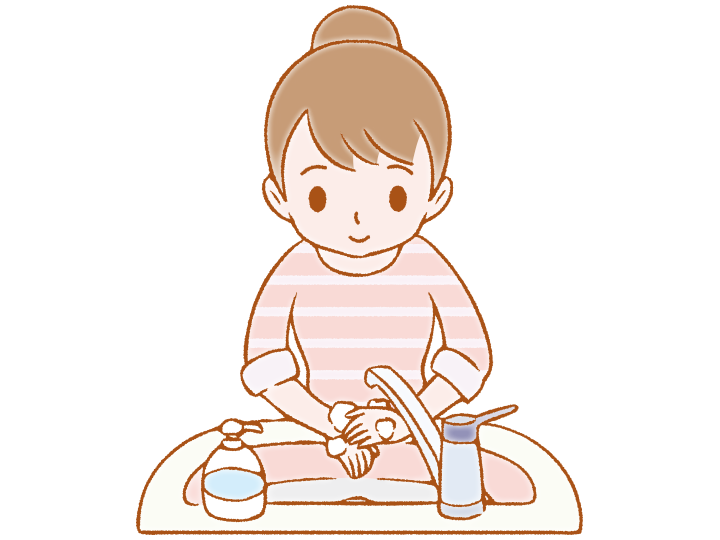
Timing for Vaccination
Vaccinations for babies born small are given on the same schedule as regular babies, without reducing the amount of vaccination. In addition, the baby will be vaccinated based on the calendar month age counted from the birthday, not the corrected age based on the expected due date. Vaccines for Haemophilus influenzae serotype b (Hib)※1, Pneumococcus※2, Hepatitis B virus※3, and Rotavirus※4 can be inoculated after 2 months and the DPT-IPV mixed vaccine※5 can be inoculated after 3 months. Babies born small may still be hospitalized in the NICU/GCU 2 months after birth, so often times they are vaccinated during hospitalization.

Even if the baby is born small, adverse events related to the vaccination (redness on the vaccinated area, fever, etc.) will not increase, and sufficient immunity can be obtained to prevent such disease. Simultaneous vaccination can also be done, so please refer to the vaccination schedule and inoculate without delay.
Starting on October 1, 2020, the details listed below have been changed regarding vaccination. If you have any questions please consult your doctor.
- Vaccination for rotavirus is included in the routine vaccination.
- Regarding the interval for inoculation of different vaccines, there is an interval of 27 days or more when inoculating live vaccines, but there is no restriction limiting the number of days for combinations of other vaccines.
*1Vaccine that prevents infections caused by influenza type b.
*2Vaccine that prevents infections caused by pneumococcus (meningitis, sepsis, pneumonia, otitis media, etc.).
*3Vaccine that prevents infections caused by the hepatitis B virus.
*4Vaccine that prevents rotavirus infections (gastroenteritis, encephalitis, etc.).
*5Vaccine that prevents diphtheria, pertussis, tetanus, and polio (poliomyelitis).
*Linked to external website.
*The information may be updated. Please check the latest information.
What fathers can do at home NEW!
We suggest that fathers devote themselves to their babies without becoming self-conscious as long as time allows. Please stare at your baby, give it a rub-down, hold your baby in your arms, and speak to it. Experience the cuteness of your baby through parenting as much as you want.
We think it will be wonderful if the time fathers have for themselves becomes the time they spend with their babies.
Parenting is not an obligation. It is an opportunity for fathers to take advantage of an experience that they can only enjoy now. Try parenting on your own initiative rather than feeling that you are just helping.
You may not be able to take care of your new baby like your wife can. Even so, you should not give up. Some day, you will see a look on your baby's face or hear it laugh in a way that you and your wife have not heard.
After giving birth, mothers may be physically weak and emotionally erratic, but they will still be committed to caring for children and keeping up with the housework. Though you may be tired when you come home from work, we feel that you should ask your partner what happened during the day, share laughs and surprises, and tell your partner that you are grateful.
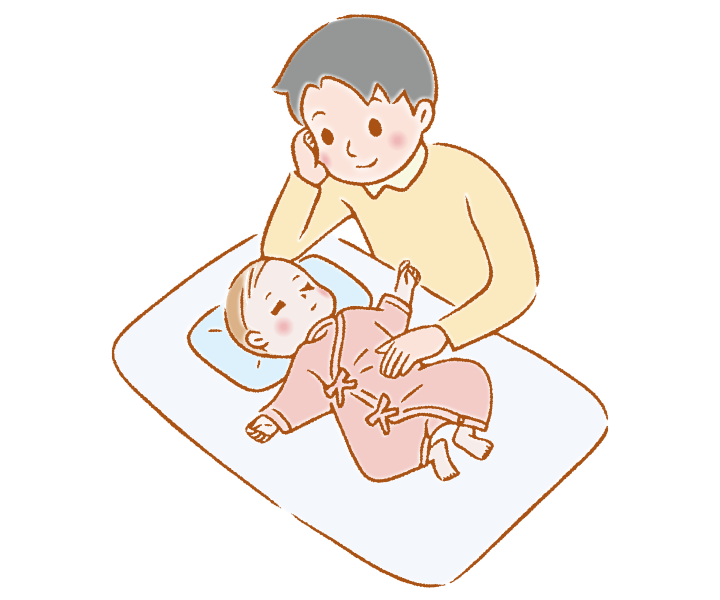
Attending Schools
Elementary schools are divided into regular classes, special support classes, and special support schools. In regular classes, one or more teachers are assigned to every 40 children, and in special support classes, one teacher is assigned to every eight children. Sometimes a child may enroll in a regular class, and attend a special support class for studying language or math only. For babies born small who may be in delicate health or have a small physique, there is also a system to delay school start. According to a national survey of babies born under 1,000g, about 74% are enrolled in regular classes.
While considering the parents’ opinion, all persons involved with the child such as educators and medical staff, will determine which school the child will attend, where he/she can enjoy participating in classes and events everyday and feel confident.

Linked to external website
Are you sure you want to continue?
* you may not be able to access this website depending on your environment. Please be aware.
